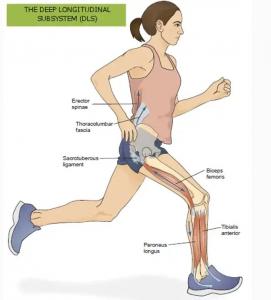The Brookbush Institute updates the course 'Deep Longitudinal Subsystem'
Find out how the erector spinae, thoracolumbar fascia, sacrotuberous ligament, biceps femoris, and fibularis work together to aid in stabilization and movement.
Additional subsystem course: Anterior Oblique Subsystem
Related to: Myofascial Sling
The Deep Longitudinal Subsystem (DLS) is comprised of:
- Thoracolumbar Fascia (Deep Posterior layer)
- Erector Spinae
- Rhomboids
- Splenius Capitis and Splenius Cervicis
- Sacrotuberous Ligament
- Biceps Femoris
- Adductor magnus
- Piriformis
- Obturator internus (and deep hip external rotators)
- Head of Fibula
- Fibularis Longus
FUNCTION (BRIEF SUMMARY):
- Concentric Function: Assists with propulsion from heel strike to push-off during gait, assists with lifting from a forward bent position, and is the prime mover of lumbar hyper-extension.
- Isometric Function: Contributes to stabilization of the tibiofibular joints, hip joints, sacroiliac joints, and all segments of the spine.
- Eccentric Function: Decelerates leg swing and impact during heel strike, eccentrically decelerates forward bending, and eccentrically decelerates ankle inversion.
COMMON MALADAPTIVE BEHAVIOR
- Over-active
PRACTICAL APPLICATION
RELEASE (self-administered, vibration, or manual):
- Erector Spinae
- Rhomboids
- Splenius Capitis and Splenius Cervicis
- Biceps Femoris
- Adductor magnus
- Piriformis, Obturator internus (and deep rotators)
- Fibularis Longus
CORE EXERCISE
- Avoid exercises that focus on strengthening the erector spinae, adductors, and/or hamstring strengthening.
Integrated Exercise
Avoid straight-legged deadlifts and kettlebell windmills.
WHY THIS IMPORTANT:
The concepts and techniques described in this course may be particularly beneficial for neuromuscular re-education, coordination, motor pattern integration, whole-body strength, functional strength, and sports performance. Sports medicine professionals (personal trainers, fitness instructors, physical therapists, massage therapists, chiropractors, occupational therapists, athletic trainers, etc.) should consider adding these exercises to their repertoire to improve the outcomes of their integrated exercise programs, sports performance programs, and therapeutic (rehabilitation) interventions.
Brent Brookbush
Brookbush Institute
Support@BrookbushInstitute.com
Visit us on social media:
Facebook
X
LinkedIn
Instagram
YouTube
TikTok
Other
Legal Disclaimer:
EIN Presswire provides this news content "as is" without warranty of any kind. We do not accept any responsibility or liability for the accuracy, content, images, videos, licenses, completeness, legality, or reliability of the information contained in this article. If you have any complaints or copyright issues related to this article, kindly contact the author above.

